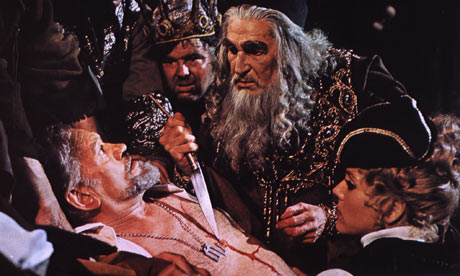
In Bech Noir, a short story by John Updike, the 74-year-old Jewish-American novelist Henry Bech fulfils the ultimate revenge fantasy of every slighted author. An English critic who had the temerity to describe Bech's fiction as "prolix" and "voulu" is crushed beneath the wheels of a subway train. Another victim, who goes public with the opinion that Bech's writing comprises a "sad orgy of Jewish self-hatred" is mysteriously poisoned. As the body count rises, Bech's 26-year-old girlfriend (now we know we're dealing with fantasy) becomes suspicious – but when Bech confesses to her, she turns out to be more impressed that appalled, telling him: "I think you've shown a lot of balls, frankly, translating your resentments into action instead of sublimating them into art."
It's philosophy apparently shared by real-life author Alice Hoffman – albeit with non-lethal results. The author of The Story Sisters took umbrage when Roberta Silman, a critic for the Boston Globe, wrote a less than favourable review of her latest novel in the course of which, Hoffman claims, surprise plot elements were revealed.
Now, giving away the plot is a no-no for any self-respecting critic, but Hoffman's reaction was – to say the least – disproportionate. She called Silman a "moron" and hurled abuse at the Globe. So far, so predictable – critics learn to develop a thick skin (I've been called a balding clueless hack on this very site, and I got over it. Eventually.) But Hoffman took things further. She published Silman's phone number and email address on Twitter and asked her readers to contact her and tell her what they thought of "snarky critics". I expect Silman has had more pleasant days than the one following Hoffman's eruption.
And when it comes to overreacting to a poor notice, Hoffman's not alone. Alain de Botton was so piqued by Caleb Crain's withering New York Times review of The Pleasures and Sorrows of Work that he was moved to post a response on Crain's own blog, in which he concluded: "I will hate you till the day I die and wish you nothing but ill will in every career move you make." At least he, however, stopped short of calling on his army of fans to rise up against the enemy. (Of course the blogosphere being what it is, this could be an impostor masquerading as the usually amiable de Botton.)
So what, then, is the best response to a bad review? Dignified silence clearly won't do; writers aren't supposed to be silent. In the days before blogging and Twitter, authors just had to hope they encountered their critics at a publishing party so they could punch them on the nose. Hofmann and de Botton might, perhaps, have been better advised to take a leaf out of the book of fellow-author Chris Bohjalian who wrote a funny self-deprecatory piece on the cruelty of critics. No writer enjoys disparagement, but Bohjalian's wryness is surely a more civilised reaction than Bech's rage, de Botton's wrath or Hoffman's hate mail.
In fact, having got her fury off her chest, Hoffman seems to have come to her senses and has apologised for her outburst. Perhaps next time she'll confine herself to writing a really nasty entry in her diary, sleeping on it and getting on with her life.

